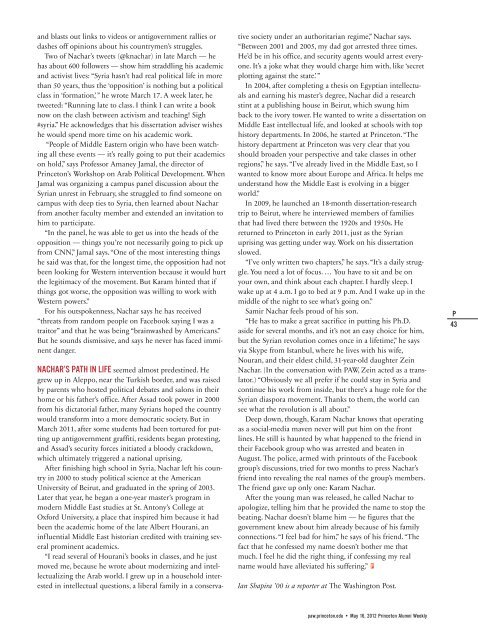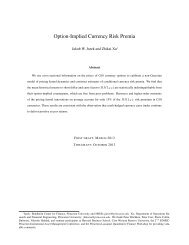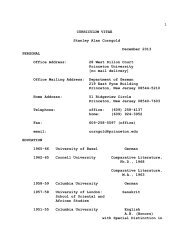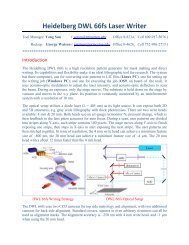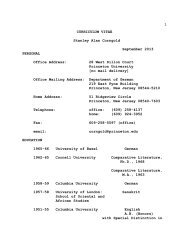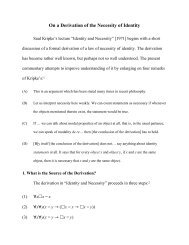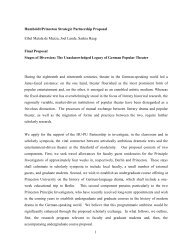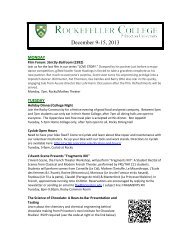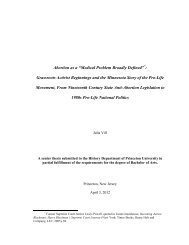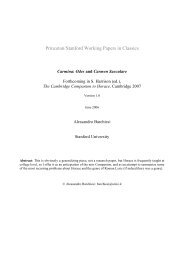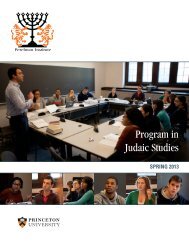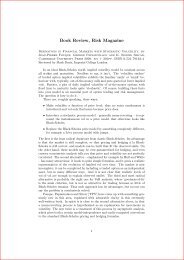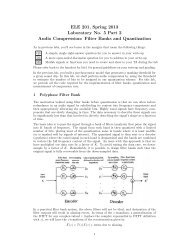Campaign residen the P -litics - Princeton University
Campaign residen the P -litics - Princeton University
Campaign residen the P -litics - Princeton University
You also want an ePaper? Increase the reach of your titles
YUMPU automatically turns print PDFs into web optimized ePapers that Google loves.
and blasts out links to videos or antigovernment rallies or<br />
dashes off opinions about his countrymen’s struggles.<br />
Two of Nachar’s tweets (@knachar) in late March — he<br />
has about 600 followers — show him straddling his academic<br />
and activist lives: “Syria hasn’t had real political life in more<br />
than 50 years, thus <strong>the</strong> ‘opposition’ is nothing but a political<br />
class in ‘formation,’” he wrote March 17. A week later, he<br />
tweeted: “Running late to class. I think I can write a book<br />
now on <strong>the</strong> clash between activism and teaching! Sigh<br />
#syria.” He acknowledges that his dissertation adviser wishes<br />
he would spend more time on his academic work.<br />
“People of Middle Eastern origin who have been watching<br />
all <strong>the</strong>se events — it’s really going to put <strong>the</strong>ir academics<br />
on hold,” says Professor Amaney Jamal, <strong>the</strong> director of<br />
<strong>Princeton</strong>’s Workshop on Arab Political Development. When<br />
Jamal was organizing a campus panel discussion about <strong>the</strong><br />
Syrian unrest in February, she struggled to find someone on<br />
campus with deep ties to Syria, <strong>the</strong>n learned about Nachar<br />
from ano<strong>the</strong>r faculty member and extended an invitation to<br />
him to participate.<br />
“In <strong>the</strong> panel, he was able to get us into <strong>the</strong> heads of <strong>the</strong><br />
opposition — things you’re not necessarily going to pick up<br />
from CNN,” Jamal says. “One of <strong>the</strong> most interesting things<br />
he said was that, for <strong>the</strong> longest time, <strong>the</strong> opposition had not<br />
been looking for Western intervention because it would hurt<br />
<strong>the</strong> legitimacy of <strong>the</strong> movement. But Karam hinted that if<br />
things got worse, <strong>the</strong> opposition was willing to work with<br />
Western powers.”<br />
For his outspokenness, Nachar says he has received<br />
“threats from random people on Facebook saying I was a<br />
traitor” and that he was being “brainwashed by Americans.”<br />
But he sounds dismissive, and says he never has faced imminent<br />
danger.<br />
NACHAR’S PATH IN LIFE seemed almost predestined. He<br />
grew up in Aleppo, near <strong>the</strong> Turkish border, and was raised<br />
by parents who hosted political debates and salons in <strong>the</strong>ir<br />
home or his fa<strong>the</strong>r’s office. After Assad took power in 2000<br />
from his dictatorial fa<strong>the</strong>r, many Syrians hoped <strong>the</strong> country<br />
would transform into a more democratic society. But in<br />
March 2011, after some students had been tortured for putting<br />
up antigovernment graffiti, <strong>residen</strong>ts began protesting,<br />
and Assad’s security forces initiated a bloody crackdown,<br />
which ultimately triggered a national uprising.<br />
After finishing high school in Syria, Nachar left his country<br />
in 2000 to study political science at <strong>the</strong> American<br />
<strong>University</strong> of Beirut, and graduated in <strong>the</strong> spring of 2003.<br />
Later that year, he began a one-year master’s program in<br />
modern Middle East studies at St. Antony’s College at<br />
Oxford <strong>University</strong>, a place that inspired him because it had<br />
been <strong>the</strong> academic home of <strong>the</strong> late Albert Hourani, an<br />
influential Middle East historian credited with training several<br />
prominent academics.<br />
“I read several of Hourani’s books in classes, and he just<br />
moved me, because he wrote about modernizing and intellectualizing<br />
<strong>the</strong> Arab world. I grew up in a household interested<br />
in intellectual questions, a liberal family in a conserva-<br />
tive society under an authoritarian regime,” Nachar says.<br />
“Between 2001 and 2005, my dad got arrested three times.<br />
He’d be in his office, and security agents would arrest everyone.<br />
It’s a joke what <strong>the</strong>y would charge him with, like ‘secret<br />
plotting against <strong>the</strong> state.’”<br />
In 2004, after completing a <strong>the</strong>sis on Egyptian intellectuals<br />
and earning his master’s degree, Nachar did a research<br />
stint at a publishing house in Beirut, which swung him<br />
back to <strong>the</strong> ivory tower. He wanted to write a dissertation on<br />
Middle East intellectual life, and looked at schools with top<br />
history departments. In 2006, he started at <strong>Princeton</strong>. “The<br />
history department at <strong>Princeton</strong> was very clear that you<br />
should broaden your perspective and take classes in o<strong>the</strong>r<br />
regions,” he says. “I’ve already lived in <strong>the</strong> Middle East, so I<br />
wanted to know more about Europe and Africa. It helps me<br />
understand how <strong>the</strong> Middle East is evolving in a bigger<br />
world.”<br />
In 2009, he launched an 18-month dissertation-research<br />
trip to Beirut, where he interviewed members of families<br />
that had lived <strong>the</strong>re between <strong>the</strong> 1920s and 1950s. He<br />
returned to <strong>Princeton</strong> in early 2011, just as <strong>the</strong> Syrian<br />
uprising was getting under way. Work on his dissertation<br />
slowed.<br />
“I’ve only written two chapters,” he says. “It’s a daily struggle.<br />
You need a lot of focus. ... You have to sit and be on<br />
your own, and think about each chapter. I hardly sleep. I<br />
wake up at 4 a.m. I go to bed at 9 p.m. And I wake up in <strong>the</strong><br />
middle of <strong>the</strong> night to see what’s going on.”<br />
Samir Nachar feels proud of his son.<br />
“He has to make a great sacrifice in putting his Ph.D.<br />
aside for several months, and it’s not an easy choice for him,<br />
but <strong>the</strong> Syrian revolution comes once in a lifetime,” he says<br />
via Skype from Istanbul, where he lives with his wife,<br />
Nouran, and <strong>the</strong>ir eldest child, 31-year-old daughter Zein<br />
Nachar. (In <strong>the</strong> conversation with PAW, Zein acted as a translator.)<br />
“Obviously we all prefer if he could stay in Syria and<br />
continue his work from inside, but <strong>the</strong>re’s a huge role for <strong>the</strong><br />
Syrian diaspora movement. Thanks to <strong>the</strong>m, <strong>the</strong> world can<br />
see what <strong>the</strong> revolution is all about.”<br />
Deep down, though, Karam Nachar knows that operating<br />
as a social-media maven never will put him on <strong>the</strong> front<br />
lines. He still is haunted by what happened to <strong>the</strong> friend in<br />
<strong>the</strong>ir Facebook group who was arrested and beaten in<br />
August. The police, armed with printouts of <strong>the</strong> Facebook<br />
group’s discussions, tried for two months to press Nachar’s<br />
friend into revealing <strong>the</strong> real names of <strong>the</strong> group’s members.<br />
The friend gave up only one: Karam Nachar.<br />
After <strong>the</strong> young man was released, he called Nachar to<br />
apologize, telling him that he provided <strong>the</strong> name to stop <strong>the</strong><br />
beating. Nachar doesn’t blame him — he figures that <strong>the</strong><br />
government knew about him already because of his family<br />
connections. “I feel bad for him,” he says of his friend. “The<br />
fact that he confessed my name doesn’t bo<strong>the</strong>r me that<br />
much. I feel he did <strong>the</strong> right thing, if confessing my real<br />
name would have alleviated his suffering.” π<br />
Ian Shapira ’00 is a reporter at The Washington Post.<br />
paw.princeton.edu • May 16, 2012 <strong>Princeton</strong> Alumni Weekly<br />
P<br />
43


